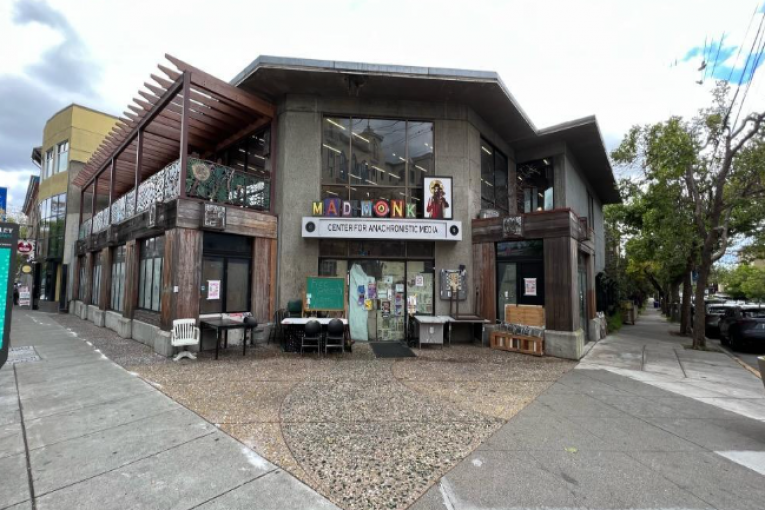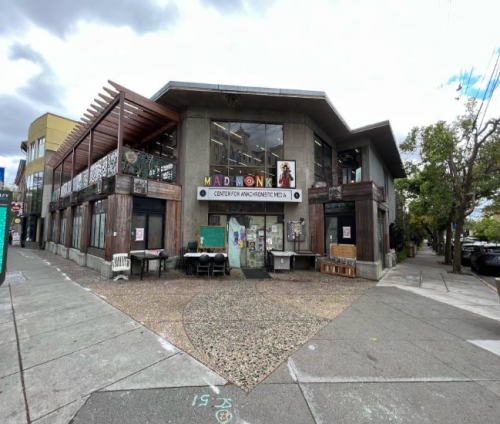

By Magellan Reyes
BERKELEY, CA — The Chess Tables on Telegraph Ave, wedged on the corner of Haste near Mezzo’s and Amoeba Records, is a centerpiece of conversation and relaxation in the sea of students, professors, and residents that flood the avenue daily.
The tables are a loose congregation of chess enthusiasts and locals with a communal atmosphere and a somewhat decentralized structure. Anyone can sit and participate or stand and watch an ongoing game. The openness of it rests in stark contrast to the space around it: businesses that provide community at a price, housing units for CAL students, and campus land populated by select groups. Not to mention the richness of the history of the corner itself, the former location of Cody’s Books (a hub for social activism for over 40 years) and current residence of the defunct Center for Anachronistic Media, now used as a storage facility for local staple Rasputin Records.
The current location has been mired in controversy, however, with the owner of the lot recently confiscating all of the materials on site. In the subsequent fallout, a community consisting of students and locals alike has formed to preserve the club, an effort which led to a recent appearance at a Berkeley city council meeting. Though the work has likely just begun, there has already been a great deal of public outcry in support of the tables, with student organizations such as Telegraph for the People and the Young Democratic Socialists of America (YDSA) at CAL assisting community members.
And in a city with limited public space near campus and a suffering but vibrant local community, the question arises of how residents can congregate in liberating and artistic ways. People’s Park was once the epicenter of this collective community expression, but now, in its current state, members of the People’s Park community find it incredibly challenging to gather in a safe and cohesive environment.
The Chess Tables on Telegraph are seen by some as a partial remedy to that. Loosely and collectively formed during the Pandemic, the tables serve as a necessary extension of the park’s values: to foster community and bring people together from all backgrounds through a shared medium.
Jesse Sheehan, a long-time Chess Tables member and Peoples Park supporter, elaborates:
“People’s Park has been vital to this neighborhood for 50 years, and even was in the pandemic, and coming out of the pandemic we immediately reemerged at the table and began playing chess every day…thirsty for human interaction…chess has been magic for the neighborhood.”
The function of chess is not just strategic in nature but communal as well. It can bring people together as a game which sets its players on equal footing, mind to mind; it is a medium of connection that emboldens communication and enlivens thought. Which is why the existence of such a lively community as the chess club has, through changes in location and support, remained a key part of the social fabric of the city.
It is important to note, however, that views on why the chess club matters, and what they mean to locals and students, vary. Some argue for what might fall into a more macro perspective—focusing on the importance of public space and the chess tables as a vital representation of just that. While others may have a more micro view that is not so broad, focusing not just on why public space is important, but why this public space is important. Why the Chess Tables of Telegraph Avenue matter. Why chess is integral to the space itself, and why the activity of chess at the tables is inseparable from the larger social benefits it provides for many in the Berkeley community.
The sentiments gathered from talking to many at the club appear to be more in line with the micro view, while student organizations can tend to lean more into the macro view. Both viewpoints are equally important, and it is worth noting that they are not mutually exclusive. The fight for public space, and for this public space, can work in tandem and even be symbiotic.
The difficulty, as it often appears, can be in the communication between the two viewpoints. Public space is worth fighting for, but not if it only remains a part of a larger-scale plan, which may neglect the thinking and feelings of the actual members involved. Students must communicate clearly with members of the Berkeley houseless, People’s Park, and long-time resident communities. The reasoning for the actions we as student supporters take with a group must include the viewpoints of the individuals that comprise it. Individuals like Gerard Markham, a Berkeley native and avid People’s Park and chess club supporter who, like Jesse Sheehan, has taken an active role in fighting to preserve the club. I met Mr. Markham soon after the tables were seized, and he agreed to sit down and discuss the tables with me.
“I share identities with almost everyone that participates in the chess community on Telegraph and Haste.” He told me, “I’m a long-term Berkeley resident…I grew up in Berkeley for 16 years. I shared this identity with members of our chess community that know what the “old” “vibrant” “outspoken” “provocative” Berkeley looked and felt like.
I’m an alumni from a well respected private institution, the University of Rochester. I share this academic identity with the bright students from UC Berkeley.
In recent times, I’ve navigated being unhoused. I share this identity with some of the regular chess club members who also experience(d) homelessness; and who also happen to be some of the strongest players in our club.
I am a nationally rated chess player that belongs to the United States Chess Federation. I share this identity with the most avid/serious chess members of our community.
There is no place in Berkeley that exists where people that share one or all of these identities converge. It’s one of the only places I can exist with each of these identities without feeling the pressure to HIDE one of those identities from the people around me. It’s safe for me to be who I am, ALL that I am, at our chess club.”
The experiences and identities of the members of the Chess Tables, of community activists and chess enthusiasts like Mr. Markham, are incredibly expansive and nuanced. They are a fundamental part of the community which has organically grown and developed through constant interaction in public space. It is in the very rich and storied places like People’s Park and the Chess Tables that one can see such prolific connection, and even unification.
And we must be cognizant of the sometimes-transitory nature of our involvement, which further underlines a vital need to connect with the community we are supporting. As new classes of students and organizers enter CAL, many in the local community will still be here working to improve the space they occupy on a significantly longer timeline. Furthermore, this will be with a multitude of different experiences on authority, political reform, and social advocacy, as well as different socio-economic backgrounds and labels imbued on them by organizations of authority, such as CAL administration.
“The Chess Community has existed for quite some time prior to moving to an open space that would allow students to participate, more comfortably.” Mr. Markham continues, “But let’s be clear; it’s my personal opinion that had our chess community still been in People’s Park; a good majority of the students and student groups that are involved today would not be. People’s Park is a contentious topic; it’s often described to students as a place that you should not go. As a result of that, it wasn’t until after 2020, that students began caring and participating with the chess community.”
Mr. Markham points to valid frustrations within the local community concerning the nature of student participation—which can be inherently transitory and affected by university backed perceptions. And although there are student organizations which can facilitate more long-term connections; the students involved, and the relationships which come from individual interactions, may not be.
Mr. Markham clarifies on the point, stating:
“That being said, student participation has reinforced our chess community and without it, our community wouldn’t look as attractive, and it wouldn’t be as dynamic. Our original chess community mixed with all of the student groups involved, creates a voting block that I believe our city officials are afraid of.”
At the end of the day the local supporters of the chess club and the student community must work together if they have a chance at preserving the tables. And in talking to Mr. Markham and others at the club, I have seen great enthusiasm around student participation. Still, it is necessary to highlight the potentially different modes of dominant thought between the members involved, as it is a crucial step toward creating a more understanding and effective coalition of chess supporters.
Views vary, and the variations between individuals fighting for the Chess club abound. But the tables are not just about compiling differences–they are about connecting them. And in the struggle for the club itself, there is an act of gradual unification—the early stages of a potentially symbiotic relationship in which students and Berkeley locals complement each other through discussion, initiative, and action. The Chess Club has the social power to unite people and connect perspectives in a way that makes them complementary–both on and off the board. Although the challenges that the club faced and continues to face are likely just the beginning, at the very least, it is telling that even in the potential destruction of the tables–a series of growing connections occur, a trait as woven into the fabric of the club as the game itself.
Additional information and context on the chess tables can be found here
Magellan Reyes is a writer for the Vanguard at Berkeley’s Social Justice desk.




